
Ticked Off: How To Prevent Tick-Borne Illnesses
Don’t let these mighty mites ruin your summer. Get wise on tick bits; an ounce of prevention is worth a pound of cure.
BY MICHAEL SCHUTZ, MD
Ticks are a special challenge for a urologist like me. I don’t usually get calls when people have a tick bite on their arm. I will get a call if the tick bite is on their privates. Embarrassing to remove, but not hard. That’s the simple part. The complicated part comes after the bite—when diseases contracted from tick bites begin to wreak havoc. These include Lyme disease, Rocky Mountain Spotted fever and Powasson.
In the Northeast, Lyme disease is a significant problem. It is caused by bacteria transmitted by a black-legged tick bite. The tick needs to be attached to the skin for at least 36-48 hours for disease transmission. If you find a tick on you, don’t panic. Using a pair of tweezers, apply gentle pressure without twisting. The tick should disengage and you can remove the tick with all parts intact. That is the simplest and easiest way to remove them. Save the tick in a small container, binding it on both sides with a piece of Scotch tape.
Avoiding a tick bite in the first place is the best method to avoid tick-borne diseases. Avoiding un-cleared areas in wilderness areas and using cleared paths as ticks typically dwell in long grasses. Insect repellant and long-sleeved clothing also helps. Once you get home or stop for the day, inspect yourself for ticks, including skin folds and the groin.
Lyme disease takes from 3-30 days to show symptoms. These can include fever, muscle and joint aches, and headaches that resemble the flu. The most classic symptom is the bullseye rash, which starts with a single red spot in the center surrounded by a larger red ring that can grow up to 12 inches around. If you notice any of these symptoms, see your doctor—and bring the tick with you if you have it.
Late symptoms can include nonspecific nerve and muscle complaints. The wide variety and lack of specific symptoms makes it hard to pinpoint off the bat, so don’t rule it out until you’ve had a blood test.
If you have a suspicious rash or flu like symptoms this summer, contact your health care provider. The treatment is usually a few weeks of oral antibiotics and if found early, there is an excellent chance of recovery.
Dr. Michael Schutz is a urologist practicing at the Jersey Urology Group in Somers Point, NJ.

